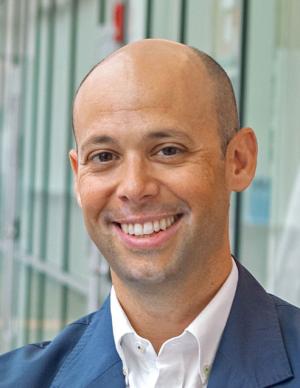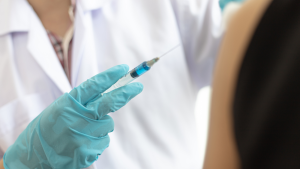Date Posted, by Susan Jenks
Researchers have recruited the first vaccine candidates to one of two new prevention trials that seek to immunize high-risk individuals against cancers associated with Lynch syndrome, the most common cause of hereditary colorectal cancer. Individuals who inherit the condition have an estimated lifetime risk as high as 80% for developing one of these malignancies, as well as an above-average risk for cancers arising in other organs, often at an early age, and regardless of race or gender.

The two experimental vaccine approaches in the trials use different strategies to prevent or delay the onset of Lynch-syndrome-associated cancers, using either proteins unique to cancer cells or overexpressed in cancer cells, but rarely expressed in healthy cells, to generate a strong immune response. Testing of the Nous-209 vaccine began in September, while the Tri-Ad5 trial (which will test three different vaccines) is expected to begin shortly, though an exact start date has yet to be determined.
Lynch syndrome affects 1 in 279 individuals, or an estimated 1.1 million people in the United States, who inherit mutations in any of five genes (MSH2, MLH1, MSH6, PMS2 and the EPCAM gene), known as mismatch repair genes. Errors in these genes hinder the body’s natural ability to repair DNA mistakes during cell division, creating instability in the genes’ coding regions, which impede the normal flow of genetic information. That, in turn, can set the stage for malignancy.
“Both vaccine [regimens] hope to train the immune system to recognize these early signals of tumor development and to disrupt them early on to achieve immunity,” said Eduardo Vilar-Sanchez, M.D., Ph.D., deputy chair of the department of clinical cancer prevention at MD Anderson Cancer Center, principal investigator in the Nous-209 trial, and co-principal investigator of the Tri-Ad5 study.
Which preventive strategy will work best is unclear. However, study results will help inform the next steps for vaccine development, Dr. Vilar-Sanchez said, as scientists refine efforts to manipulate the immune system to gain an anticancer advantage over hereditary and other non-viral induced cancers.
Testing Vaccines that Work in Different Ways
The Nous-209 vaccine—named partially for the number of neoantigens or “new” antigens it contains, and in part for the Switzerland-based company (Nouscom) that developed it—employs what investigators call “a brute force” approach. The vaccine contains 209 bits and pieces of cancer-specific neoantigens expressed only in premalignant or malignant tissues of individuals with Lynch syndrome that researchers hope will stimulate a robust immune-system attack that stops cancer progression at its origin.
In comparison, the Tri-Ad5 vaccines, developed through the National Cancer Institute’s (NCI’s) intramural program, rely on three tumor-associated antigens that are overexpressed in cancer cells, but are also found to a lesser degree in healthy tissues. Because early studies suggested that the approach with only the MUC-1 antigen showed promise, investigators added two other antigens (CEA and brachyury) in the Tri-Ad5 vaccines, which will be combined with an Interleukin-15 (IL-15) “superagonist,” a vaccine stimulant, to increase the vaccine’s potential for destroying premalignant lesions or early tumors.

As of January 2023, investigators had enrolled 10 participants diagnosed with Lynch syndrome into the Nous-209 trial, which has a final recruitment goal of 45 participants. Dr. Vilar-Sanchez said the phase 1 study, assessing both safety and immunogenicity (the ability to generate an immune response), is open to individuals who test positive for mutations in one of the five known DNA mismatch repair genes and remain cancer-free. The trial will have sites in California, Pennsylvania, Texas, and Puerto Rico, representing a diverse population.
The trial for the Tri-Ad5 vaccines, licensed to ImmunityBio in Culver City, California, has stricter criteria for study entry, a plan to enroll nearly four times as many participants, and, as it’s a phase 2 study, a clinical cancer preventive efficacy endpoint. Investigators will look both for an immune response and whether the vaccine reduces precancers and new cancers among colorectal cancer survivors and individuals whose precancerous lesions put them at high risk for further disease development.
“This [Tri-Ad5 vaccine trial] will be the largest Lynch syndrome cancer prevention study done in the U.S.,” said Asad Umar, D.V.M., Ph.D., a senior advisor to the director for translational research in NCI’s Division of Cancer Prevention (DCP) and a scientific lead for the trial. In addition to the high lifetime risk for colorectal cancer, he said, the syndrome carries a high lifetime risk of up to 60% for endometrial cancer, 12% for ovarian cancer, and 6% for gastric cancers. Lynch syndrome carriers are also vulnerable to moderate increases in lifetime risks for brain, kidney, and bladder cancers, among others.
Lynch syndrome’s impact on multiple organ systems in the body contributed to its selection for these early preventive vaccine efforts, according to Dr. Umar and other scientists. Also important, they say, is the predictability of the mutated neoantigens shared by tumors in this genetic disorder.
Although the Nous-209 vaccine includes a large number of possible neoantigens, there is a question of whether “more antigens are sufficient and necessary to get the best cancer preventive response,” Dr. Umar said, referring to the Nous-209 vaccine strategy. The decision to try a different approach in the Tri-Ad5 trial, he said, came from encouraging published data with MUC-1, a cell-surface protein overexpressed in many cancers.
“It wasn’t 100% effective in reducing the return of [precancerous] polyps after 3 years,” in non-Lynch-syndrome colorectal cancers, he said. “But it gave us a clue that the vaccine is promising in those where immune response was active, hence the strategy to include the IL-15 superagonist to boost the immune response.”
Aside from design differences, the vaccine regimens also differ in dosing schedules. Volunteers for the Nous-209 vaccine will be inoculated with an initial shot to prime their immune systems, followed by a booster later. In the Tri-Ad5 trial, participants will get four injections, the final one a year after study entry.
Researchers frequently use weakened or inactivated adenoviruses, which cause the common cold, as vaccine vectors, because of the ease with which they slip into target cells and their relative safety. Other delivery systems are under study, including DNA molecules, protein-based or peptide-based models, and RNA, which is used in some COVID-19 vaccines. At this time, scientists generally think that RNA molecules may not provide long-term immunity without the use of multiple boosts for preventive cancer vaccines, Dr. Umar said. However, he explained, RNA vaccine technology may prove helpful in rapidly identifying which antigens elicit the strongest immune response against newly forming tumors.
Taking Steps Toward a “New Era” in Vaccine Development

As both studies move forward, many theoretical concerns remain, such as whether the Nous-209 vaccine will protect against other neoantigens that arise as tumors’ complexity comes into play and new variants emerge.
“Immune escape is a legitimate concern,” said Shizuko Sei, M.D., a medical officer in DCP, referring to the mutational changes in tumors that vaccines can miss. And yet, if the vaccine works in carcinogenesis as intended, she said, it could provide better immune control.
Because the tumor antigens in the Tri-Ad5 vaccines are also present in healthy cells, the immune system’s ability to distinguish between “self” and “non-self” could be compromised. The immune responses may not be robust enough to immunize against cancer if the vaccine recipient’s immune system sees the antigens as “self” and fails to attack them, Dr. Sei said. Nevertheless, ways to enhance tumor visibility are underway to prevent autoimmunity and preserve the potency of selected antigens, she said.
Despite such hurdles, researchers see the two vaccine trials as an encouraging step toward a new era in vaccine development. Although the immediate goal is to ease the cancer burden in high-risk individuals, they say, eventually the hope is to create off-the-shelf vaccines that work against cancers in the general population, as they first arise.
This is not impossible, but clearly not feasible in the near-term, Dr. Sei said. “Right now, we are focused on helping high-risk populations, and they, in turn, are teaching us how to develop better cancer preventive vaccines for the future.”
If you would like to reproduce some or all of this content, see Reuse of NCI Information for guidance about copyright and permissions. Please credit the National Cancer Institute as the source and link directly to the blog post using the original title, for example: "Trials Test Vaccines for Prevention or Delay of Cancers Associated with Lynch Syndrome was originally published by the National Cancer Institute." For questions, contact us at CancerPreventionBlog@mail.nih.gov.
